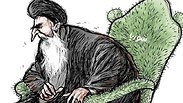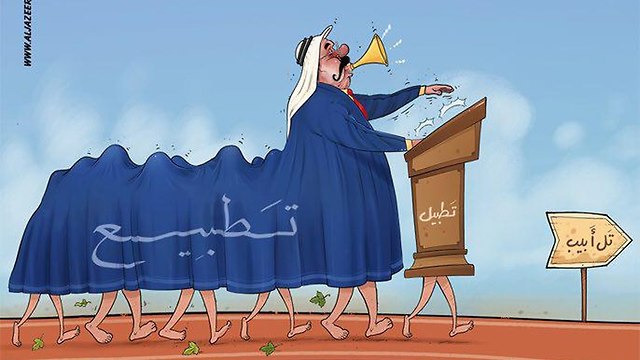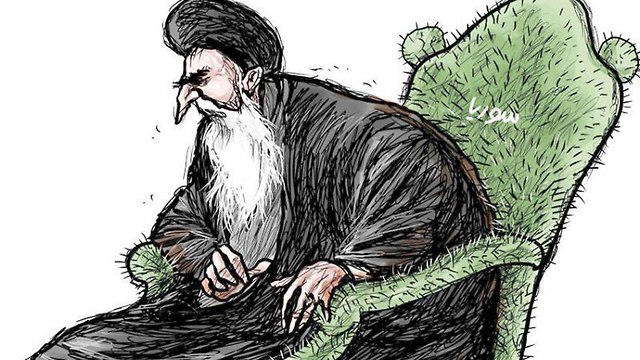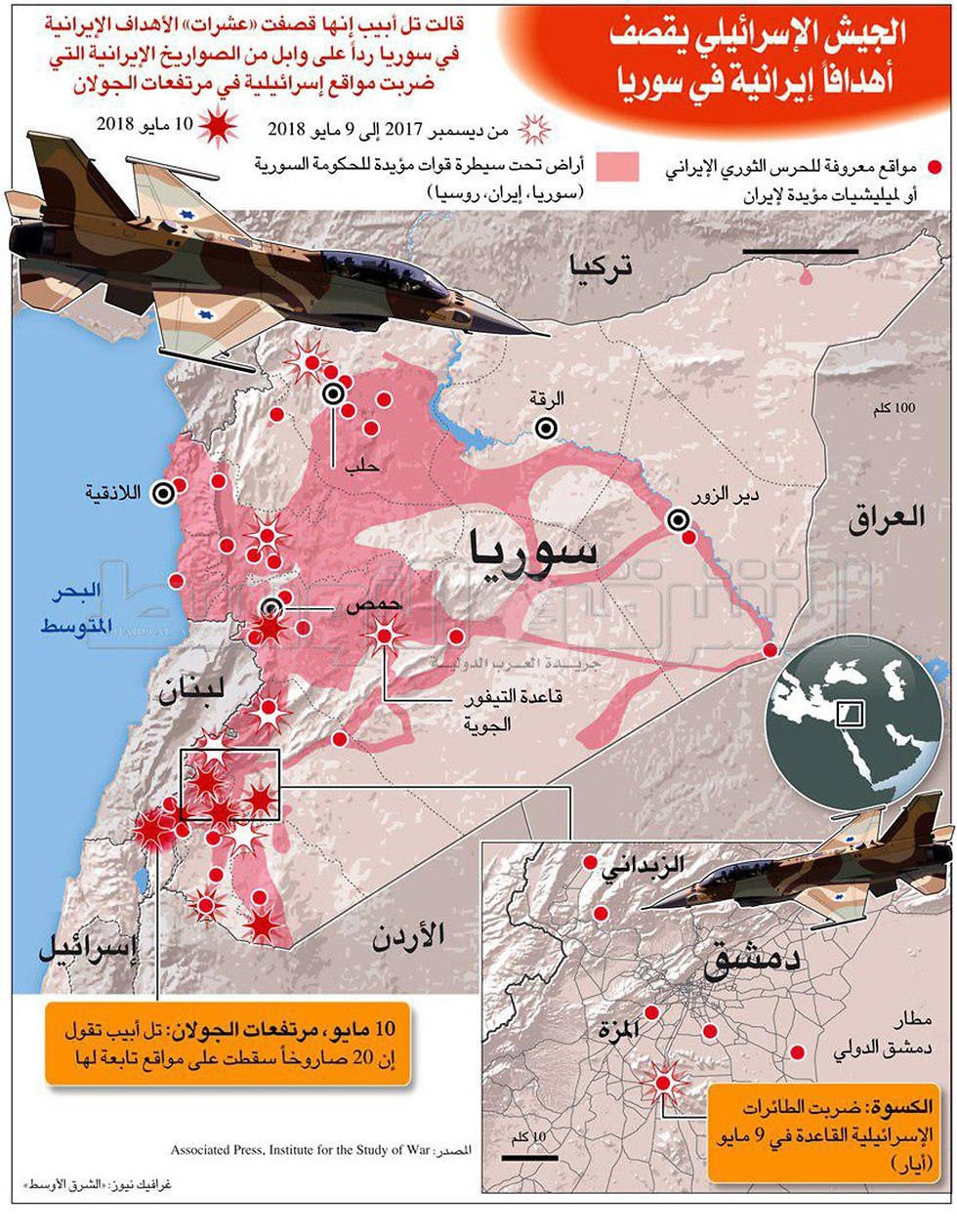
Coverage of Israeli strike in Arab media reflects divisions
While media affiliated with Hezbollah portrayed Israeli strike as glaring failure, other Arab media outlets justified it, going so far as to claim majority of Syrian would have supported it; Bahraini foreign affairs minister who said Israel was within its right to strike back at Iran nevertheless criticized by media.
The operation was dubbed "House of Cards" in Israel, but the Hezbollah-affiliated Al Akhbar daily called it the "Night of Rockets." Similarly, the paper's editorial Friday discussed the issue of the Israeli-Iranian clash in the Syrian arena.
The editorial presented the Arab "resistance" as a catalytic factor that influences and steers events. Israel concluded the operation, the paper opined, without achieving its regional goals and, in fact, suffered more losses and damages than it was willing to admit.
The paper further presented the performance of Israel's active defense systems as a failure, since "the Iron Dome could not handle the number of targets, their speed and their density"—referring to the rockets launched from Syria at Israel.
Al Akhbar further quoted a Syrian army source, who claimed that Israel never intended to target Iranian sites, and that most of the targets in its pool knowingly and intentionally belonged to the Syrian army.
The Israeli strikes, that is—which targeted more than 50 sites—were in response to Iranian fire from within Syria, but were aimed at Syrian targets.
Al Akhbar concluded by saying that a new phase had begun in the Syrian conflict. "Despite the losses Israel had caused," the paper said, "a message needs to be conveyed quickly, and that is that we are capable of attacking (Israel) in several ways despite (its) claims of control over the Syrian arena and numerous defensive measures."
Al Jazeera, meanwhile, quoted a researcher at the French Institut de relations internationales et stratégiques (IRIS) as saying that Iran understood "it could not leave its forces on the Israeli border region permanently" and that Israel had a right to be worried by the Islamic republic's presence there, consider the danger Iran allegedly posed.
The Qatari news outlet, however, pointed out that Israel's security and intelligence apparatus was well aware of the Iranian presence within Israel's neighbor and has been monitoring it.
The article went on to explain that Iran aspired to stay on the ground just long enough to ensure that the new Syrian regime finding its footing in the post-conflict era is congruent with its own interests.
Iran's end goal, Al Jazeera posited, was to place oil and gas pipelines throughout the Middle East and from Lebanon to Europe.
Bahraini FM blasted for saying Israel within its rights to attack Iran
While many in the Arab world busied themselves with developments, it appeared no one was quick to respond or to directly intercede with Israel's conflict with Iran in Syria.

Bahraini Minister of Foreign Affairs Khalid bin Ahmed Al Khalifa, however, deviated from the norm by tweeting on his personal account Thursday, "As long as Iran is violating the status quo in the region, and is flooding countries with its troops and missiles, any state in the region, including Israel, is entitled to defend itself by destroying the sources of danger."
His statement took not only Israelis—citizens and politicians alike—by surprise, but also many in the Arab world. Al Khalifa's contention made front page news and top stories in many news papers and sites, and those affiliated with Iran were naturally quick to note this was the continuation of the Gulf countries' "normalization" with Israel.
Back to Qatari Al Jazeera—which has been boycotted by the other Gulf states including Bahrain—it published a caricature showing the Bahraini top diplomat leading a "normalization procession" marching towards Tel Aviv.
'A woman whose son was killed by the Revolutionary Guards will not hesitate to pray for Israeli victory'
The London-based Asharq Al-Awsat, which often uses terminology such as "the occupied Golan", "the Israeli occupier" and other terms that usually characterize Arab media, covered the latest Israeli strikes by highlighting Israel's military supremacy in the region.Israel left the operation unscathed, the paper maintained, in complete contrast to the manner in which the bombing's results were portrayed in Syrian and Lebanese media.
Abdulrahman al-Rashed, the newspaper's former editor and former general-manager of the Saudi-owned pan-Arab Al Arabiya television network, wrote an editorial titled, "Whom do you stand with, Iran or Israel?"
In the editorial, al-Rashed claimed that positions in the world of politics change in accordance to "interests and necessities." If Syria's population was polled on whether it supported the Israeli strike against Iranian forces and the militias subordinate to them, he said the vast majority would have supported it.

"There is no excuse stronger than defending the right of 600,000 people and the 10 million displaced citizens from the crimes of Iran's forces and allies," he stated.
"If you ask any Syrian or Lebanese woman whose son was killed by the Iranian Revolutionary Guards," he continued, "she will not hesitate to pray for victory to Israel and for the loss and defeat of its rivals."
While that was the case, al-Rashed clarified that, "This does not make the Israelis right in occupying Palestinian territories or right in their persecution of the Palestinian people."
In conclusion, al-Rashed wrote he thought the aim was "to force Tehran's regime to retreat. The plan includes US President Donald Trump's decision to scrap the nuclear agreement and reinstate economic sanctions. This is in addition to getting Israel's military involved via the painful strikes that destroyed Iranian sites and convincing the Russians to be neutral."
"All this aims to serve the same purpose," he affirmed, "after the Tehran government refused international calls to militarily retreat to its borders and to stop interfering in the affairs of the region's countries and toppling their governments."












